Reini Otter is on a mission to have Healthy Heads in Trucks and Sheds
Today he is CEO of Frasers Property Industrial but Reini Otter’s cancer diagnosis after years of stress led him to make big changes for himself, and now warehouse workers and truckies alike.
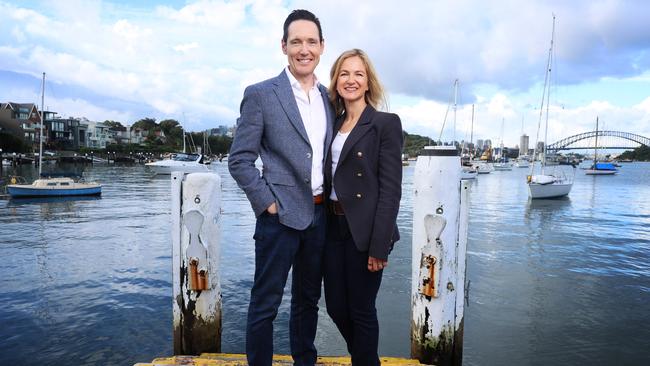
Reini Otter jokes that he felt “invincible” after celebrating his 34th birthday in 2004.
After leaving university as a qualified architect, he had worked with the late billionaire Lang Walker’s Walker Corporation before landing a senior executive role with the giant Australand Property Group, reporting to then-CEO and now industry legend Brendan Crotty.
Otter had never had a health issue, not even a single broken bone. He was also happily married and about to become a father for the first time.
But as 2004 went by, he started to realise something was wrong. The pain in his stomach that had steadily got worse, refused to go away.
Twice he went to his local GP in the Sydney Harbourside suburb of Five Dock, only to be brushed away and handed a prescription for stomach medication.
His third trip in October that year changed his life forever.
“I was sent for an endoscopic biopsy and I remember the doctor saying to me, ‘Congratulations, you’ve got the biggest ulcer I have ever seen’,” Otter now recalls. He then returned to the doctor a few days later, by himself, to get the biopsy results.
“I didn’t think it would be serious so I went on my own. Then he told me I had stage three duodenal cancer. It was incredibly rare for someone of my age.”
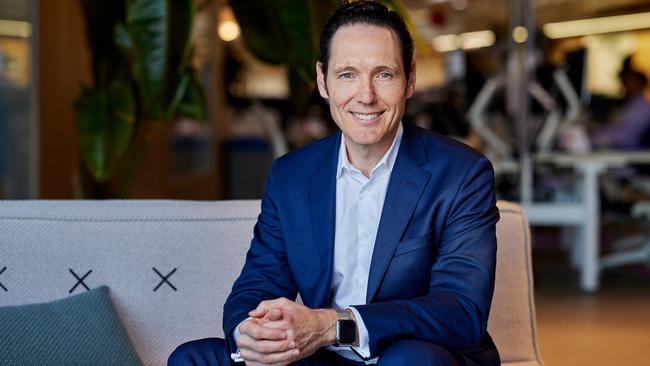
Just three weeks earlier, Otter’s first daughter Mia had been born. He and wife Belinda Falsone had also just moved into their home after renovating the kitchen and were deep in debt.
A fortnight later, he was in surgery for what he quips was “slash and burn” treatment: a 12 hour operation to have his stomach and pancreas removed, followed by six months of intensive chemotherapy.
Remarkably during the marathon surgery procedure, St Vincent’s Hospital suffered a power cut.
“My wife was sitting there in the dark with our three week old baby waiting to hear what was going on,” he laments, before adding, coldly: “Those first few months with your new child are supposed to be some of the most important and joyful moments in your life. I spent that time in a hospital and in a chemo ward.”
When Otter was moved to intensive care after the surgery, he suffered a collapsed lung. After being stabilised and discharged, it was into six months of physical and mental hell.
“The first chemo treatment you don’t know what to expect. It was a three day infusion, with all the feelings of nausea and vomiting,” he says.
“Then when you know what to expect, as soon as you are driving across the Anzac Bridge to the hospital, you can feel the nausea coming on. You know what’s coming. So I just got into the mode of retreating into myself. You tolerate the treatment, you then spend the next week and a half building yourself up and you do it again. You do that for six months. So it’s very long.”
When the chemotherapy was over, Otter checked himself into a mental health retreat in Melbourne’s Yarra Valley where he joined a 10 day program for people living with and surviving cancer.
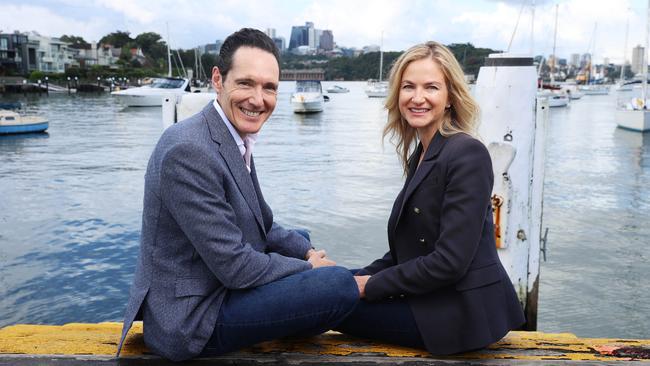
“What I realised down there was that it is often when people have a second or third bout of cancer, they decide to make a career change. I was determined that that wasn’t going to be me,” he says.
“I experienced mental health challenges for a couple of years after my treatment which even at the time I didn’t really recognise. But one of the massive things I got out of the experience was the impact of the support network around you and what that can do for you, especially your family.”
History now shows that Otter stayed with the commercial industrial division of Australand until it was acquired in 2015 by a specialist business unit of Singapore-listed real estate giant Frasers Property Group, which has about $45bn of assets under management.
Today he is CEO of Frasers Property Industrial, a multinational industrial, logistics and commercial property development group and strategic business unit of the SGX-listed Frasers Property Limited.
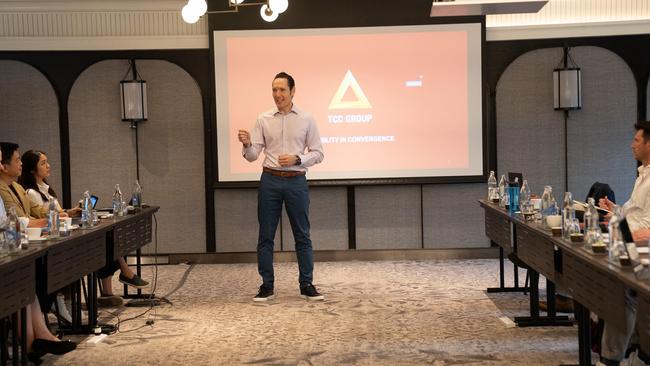
Under his leadership it has grown to be a significant player in the Australian industrial property market, and is building success across South East Asia and Europe.
Otter’s personal journey as a stage three cancer survivor has deeply influenced his leadership of the business.
He now champions a high-performing team and emphasises the importance of health and well-being as part of that culture.
In that context, Frasers is challenging the status quo of warehouse development in Australia, Asia and Europe by providing healthy and engaging workplaces for tenants and their employees.
“As an architect, I know the impact that the built environment has on people. So we don’t just want to improve the efficiencies of those buildings. We want to push the boundaries to contribute to the health and well-being of the people that work in them as well,” he says.
Family background
Otter’s father Helmut, who emigrated from Austria to Sydney in the 1960s, has his own story of trauma.
He lost his mother and sister in a bombing raid during the Second World War. The only reason he survived was that he was sent out to find food for the family, keeping him away from the house when the bomb dropped.
He never talked about the pain of that episode for decades.
“I think it was very traumatic, and it definitely affected him deeply. But more recently, a few years before Covid, he started to want to talk. So we made recordings of him and tried to make as many notes as we could,” his son says.
“It is very interesting because it does go to show people and how they approach things. He ran his business his whole life and worked extremely hard. He basically just worked. I’m sure it came from his early experiences.”
After landing first in Perth and then Sydney, unable to speak a word of English, Helmut Otter – a mechanic by trade – found himself a niche working on European cars.
He then married a proud third generation Australian girl named Margaret, but they were divorced within a decade. Reini Otter, who carries his father’s first name as his middle name, was only six when his parents split.
He and his two siblings grew up with his mother, who he adored till the day she died.
“She was an extremely strong woman. Her sole focus was just making sure that the family was looked after. We didn’t have much money. But her focus was on getting us all into the best school possible, making sure we had an education, and then everything else was sort of secondary,” he says.
In 2004 his cancer diagnosis gave Otter the opportunity to reconnect with his father, who he had not seen for a decade.
My experience with cancer and the recovery gives you the confidence to just say, ‘Well, there’s a better way to lead.
A year later, his mother was to face her own cancer battle. But she wasn’t as lucky as her son.
“Unfortunately as I finished my chemo, she got diagnosed with multiple myeloma, which is a cancer of the blood. So I went from finishing one round of chemo and then my mum was diagnosed with that,” he says solemnly.
She passed away in 2012.
“So there was a few years of her in treatment. It’s one of those things, I guess. You go through your life with a broken bone, and then the next minute stuff is going on everywhere.”
Through it all, his rock has been his wife, who he met at university. Belinda is also an architect by training.
During his chemotherapy treatment they were warned they may be unable to have more children. They were lucky enough to have another two.
Otter’s 40th birthday celebration in 2010 was extra special. He describes it as “a festival of 40ths.”
He took six weeks off work and went travelling around the ski fields of Europe with his family.
He still remembers Belinda’s reaction to his cancer diagnosis like it was yesterday. She had spent time researching his symptoms and had already conditioned herself for the bad news.
“But her response was incredible. He first child was three weeks old and she got faced with that news. But instantly she formed almost like a protective environment around me,” he recalls.
“She’s the one that made sure I had the best doctors. She was in every meeting with me, spoke more than I did, asked more questions than I did. Because when you are a person that is in the situation, it is very difficult to think straight. Yet she was somehow able to manage the load of being a new mother in that situation, while being my primary carer as well. She is just so strong.”
Finding a better way
Otter and Frasers are now prioritising mental health for clients, developing high-quality facilities that have what he calls “premium office-like” well-being features, something not normally included in traditional warehouse and shed design.
Frasers has also implemented a range of initiatives to empower its own workforce to manage stress and maintain overall well-being, including mental health awareness training, offering wearable health and fitness tech, yearly health checks and ergonomic training.
These started in Australia and despite the cultural challenges, have now been expanded into Fraser’s operations in South East Asia and Europe.
Otter is also a founding member of the not-for-profit “Healthy Heads in Trucks and Sheds”, which is working to improve psychological safety and physical well-being across the road transport, warehousing and logistics industries in Australia. It is chaired by Australia Post CEO Paul Graham and supported by Woolworths and Coles as members.
Almost half of the workers in the transport and logistics sectors have some sort of mental health issue and suicide is the third leading cause of death.
Australia’s industrial sector continues to be the backbone of the economy and Otter says the Frasers business continues to perform strongly.
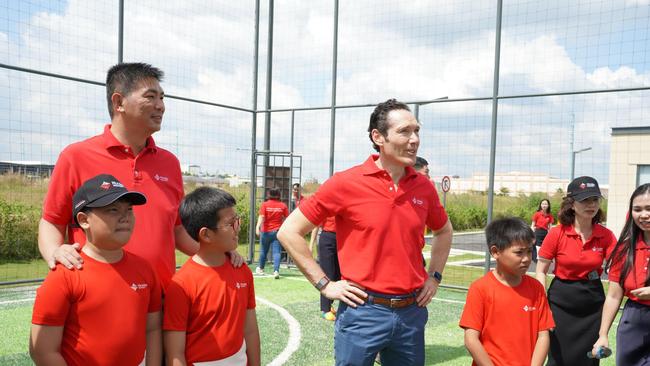
Vacancy rates for industrial land in Australia’s key east coast markets remain around 1 per cent and rents are still rising in the high single digits after surging 45 per cent since 2021.
CBRE is forecasting the sector to be worth more than $400bn by the next decade.
The majority of Fraser’s portfolio is focused along the eastern seaboard where it has developed large, state-of-the-art facilities for clients including Woolworths, Techtronic Industries, Symbion, ASX-listed IVE Group, National Tiles and Goodyear.
“We are generally in the top two or three in terms of developers each year and in terms of assets under management, we are number five or six. So we are a really meaningful player,” Otter says.
In March, Frasers joined with logistics giants ESR to purchase a 64.4 hectare development site at Cranbourne in Melbourne’s southeast which they plan to develop into a $900m industrial estate.
Frasers, Australand and their previous entities celebrate 100 years in business in Australia this year.
Now 54, Otter still pinches himself given where he is at in business and in life. His eldest daughter Mia turns 20 this year.
“I guess my experience with cancer and the recovery gives you the confidence to just say, ‘Well, there’s a better way to lead than there was in the past.’ For me, it’s basically about how can we make sure that potentially, what happened to me doesn’t happen again,” he says.
“Getting cancer is nobody’s fault. Nobody knows why. But I do firmly believe that stress played a big part in it. Because I think about myself before cancer, and just the stress I put on myself and everything I took on. But at the time, I just wanted more. So I now firmly believe that while you actually want this type of person in your business, as an employer it is your responsibility to give them the tools to make sure they can manage it effectively. It’s like a duty of care.”
In 2005 Brendan Crotty gave Otter a choice to do whatever he wanted after winning the biggest battle of his life. But he only sought one path.
“I wanted to come back full time and I’ve been doing it for 25 years now, effectively in the same company,” he says.
“I know it might sound cliched, but the ability to make a difference is real. If you’ve got the ability to do that, it is something that is truly good to do.”


To join the conversation, please log in. Don't have an account? Register
Join the conversation, you are commenting as Logout